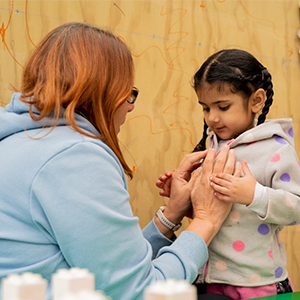
A Te Rito Maioha researcher is conducting a study to uncover the experiences, challenges and successes of early childhood teachers working with refugee children.
It is hoped the work will fill gaps in knowledge and training for teachers who are currently navigating their own way with growing numbers of refugee children in early childhood education.
Te Rito Maioha Early Childhood NZ lecturer and researcher Anoop Kumar has interviewed and observed ECE teachers based in Palmerston North, one of the main centres refugee families are settled after their initial five-week programme in Mangere.
“Teachers say the rewards of teaching and building relationships with the children and families are incredible – but they’re also navigating complex challenges.
“There are communication barriers with families who have no English language and diverse cultural backgrounds. And, young children who may display fearfulness, anxiety and over-dependence to aggression, gunplay and disrespect for teachers.”
Even using a range of strategies, it could take many weeks for teachers to build trusting relationships and settle the children into their centres.
Although existing professional training in cultural diversity assists to some extent, Anoop says children of refugee families who have experienced trauma of war or persecution have vastly different needs to the children of migrant parents.
“There’s a need for specific professional training and guidance to support and enhance teacher’s work with young refugee children and families,” says Anoop.
“Teachers are having to learn from observation and conversations with colleagues, parents, support workers and community organisations,” says Anoop. “They often find themselves in confused territory. There are big variations between centres in how they respond in practice and philosophy.”
Once complete, Anoop says his research into early childhood teacher’s experiences can be used to inform and develop professional training that will make a difference to both children and teachers.
“If we want to identify ways to improve and support ECE teachers’ practices with refugee children and their parents, we need to understand their experiences, interactions, challenges and successes.”
Te Rito Maioha members may access more information on Anoop Kumar’s early findings here.